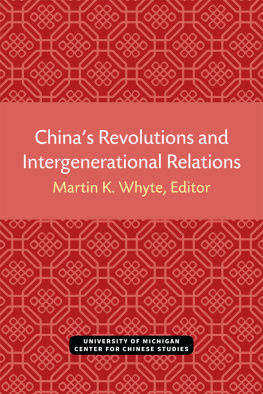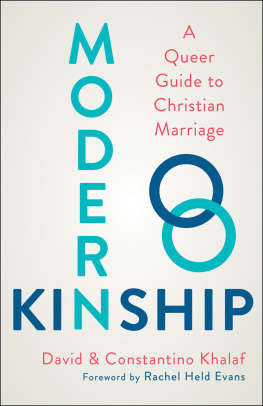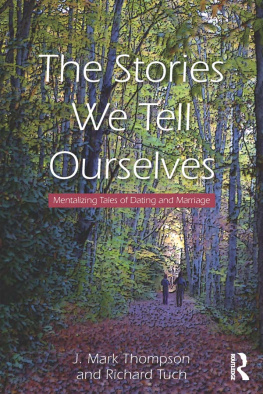DATING, MATING, AND MARRIAGE
DATING, MATING, AND MARRIAGE
Martin King Whyte
SOCIAL INSTITUTIONS AND SOCIAL CHANGE
An Aldine de Cruyter Series of Texts and Monographs
EDITED BY
Peter H. Rossi Michael Useem James D. Wright
Bernard C. Rosen, The Industrial Connection: Achievement and the Family in Developing Societies
Paul Diesing, Science and Ideology in the Policy Sciences
James D. Wright, Peter H. Rossi, and Kathleen Daly, Under the Gun: Weapons, Crime, and Violence in America
Walter I. Wallace, Principles of Scientific Sociology
Robert C. Liebman and Robert Wuthnow (eds.), The New Christian Right: Mobilization and Legitimation
Paula S. England and George Farkas, Households, Employment, and Gender: A Social, Economic, and Demographic View
Richard F. Hamilton and James D. Wright, The State of the Masses
James R. Kluegel and Eliot R. Smith, Beliefs About Inequality: Americans Views of What Is and What Ought to Be
James D. Wright and Peter H. Rossi, Armed and Considered Dangerous: A Survey of Felons and Their Firearms
Roberta G. Simmons and Dale A. Blyth, Moving into Adolescence: The Impact of Pubertal Change and School Context
Carolyn C. Perrucci, Robert Perrucci, Dena B. Targ, and Harry R. Targ, Plant Closings: International Context and Social Costs
Robert Perrucci and Harry R. Potter (eds.), Networks of Power: Organizational Actors at the National, Corporate, and Community Levels
David Popenoe, Disturbing the Nest: Family Change and Decline in Modern Societies
John Mirowsky and Catherine E. Ross, Social Causes of Psychological Distress
James D. Wright, Address Unknown: The Homeless in America
Alice S. Rossi and Peter H. Rossi, Of Human Bonding: Parent-Child Relations Across the Life Course
G. William Domhoff, The Power Elite and the State
David Knoke, Organizing for Collective Action: The Political Economies of Associations
Martin King Whyte, Dating, Mating, and Marriage
ABOUT THE AUTHOR
Martin King Whyte is Professor of Sociology at the University of Michigan. He received his undergraduate education at Cornell University and MA and Ph.D. at Harvard University. His primary research interests are the sociology of the family and social change in the Peoples Republic of China. He is the author of Small Groups and Political Rituals in China (1974); The Status of Women in Preindustrial Societies (1978); Village and Family in Contemporary China (co-authored, 1978); and Urban Life in Contemporary China (co-authored, 1984).
First published 1990 by Transaction Publishers
Published 2017 by Routledge
2 Park Square, Milton Park, Abingdon, Oxon 0X14 4RN
711 Third Avenue, New York, NY 10017
Routledge is an imprint of the Taylor and Francis Group, an informa business
Copyright 1990 by Taylor & Francis.
All rights reserved. No part of this book may be reprinted or reproduced or utilised in any form or by any electronic, mechanical, or other means, now known or hereafter invented, including photocopying and recording, or in any information storage or retrieval system, without permission in writing from the publishers.
Notice:
Product or corporate names may be trademarks or registered trademarks, and are used only for identification and explanation without intent to infringe.
Library of Congress Cataloging-in-Publication Data
Whyte, Martin King
Dating, mating, and marriage / Martin King Whyte.
p. cm. (Social institutions and social change)
Includes bibliographical references.
ISBN 0-202-30415-9. ISBN 0-202-30416-7 (pbk.)
1. MarriageUnited States. 2. Dating (Social customs)United States. 3. Mate selectionUnited States. I. Title. II. Series.
HQ728.W526 1990
306.81 '0973dc20
89-17996
CIP
ISBN 13: 978-0-202-30415-1 (hbk)
Contents
ACKNOWLEDGMENTS
Many individuals and organizations deserve thanks, but of course no blame, for assisting this study from its inception to its completion. Initially a Rackham Faculty Fellowship from the University of Michigan provided me with support while I developed the plan for the research reported here. I received advice, criticism, and assistance from a large number of individuals, including Arland Thornton, Karen Mason, Al Simkus, Ema-Lynne Bogue, Eloise Elliott, Pat Preston, Chen Jieming and Xu Xiaohe. Ronnie Whyte provided invaluable support at each stage of the research, from serving as a guinea pig respondent for several of the earliest draft versions of the questionnaire to listening patiently as draft chapters were read to her. I would also like to thank participants in the Faculty Family Studies Seminar and the Center for Research on Social Organization brownbag talk series at the University of Michigan, who were subjected to earlier versions of portions of this study and responded in helpful ways. A subsequent, companion research project devoted to replicating the current survey in Chengdu, China, has been generously supported by the US-China Cooperative Science Program of the National Science Foundation. Even though few of the results of this companion project are directly visible in the pages that follow, the support and encouragement received have enriched this study in many ways. Alice Hogan wielded a sharp editorial pencil, helping me to clear up problems in the final manuscript.
My greatest thanks go to the staff and students who participated in the project that forms the primary basis for this study, the 1984 Detroit Area Study (DAS) survey. The skilled expertise provided by the DAS directors, secretarial staff, students, and professional interviewers, makes it possible for faculty investigators with minimal or rusty survey research skills to translate their ideas into substantial and high quality research. In the case of this particular rusty investigator, the Directors for the 1984 DAS Survey, Jean Converse and Stanley Presser, provided instruction, guidance, patience, and good humor that made the laborious and lengthy survey process both enjoyable and enlightening. Stanley also proved a delightful and helpful teaching companion for the final DAS seminar, devoted to guiding our graduate students in writing data analyses based upon the survey. Together Jean and Stanley made conducting the survey seem more like summer camp than boot camp, and I will always look back fondly on our shared experience. Other participants in the DAS team also deserve substantial credit for guiding this study through to its conclusion. In particular, Carol Crawford prepared countless versions of revised questionnaires and managed the DAS office with charm and competence. Several talented teaching assistants Lynette Kono, Jason Lee, Paula Rust, and David Williamsplayed key roles in guiding the students and advising the investigator. And the two dozen students enrolled in the 1984 DAS training course and the like number of professional interviewers from the Survey Research Center at the University of Michigan provided the manpower and skill at every step of the way, and particularly for the interviewing field season, which were essential for the success of this project. Last, but not least, the 459 respondents who willingly let us probe into their private lives and marital histories provided the basic fabric from which I attempt to answer a wide range of questions about dating, mating, and marriage in the pages ahead. This was truly a team eifort, and I take pride in, but not full credit for, the results.









